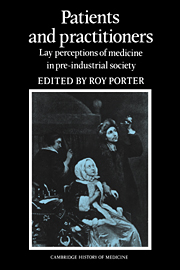Book contents
- Frontmatter
- Contents
- 1 Introduction
- 2 Murders and miracles: Lay attitudes towards medicine in classical antiquity
- 3 Puritan perceptions of illness in seventeenth century England
- 4 In sickness and in health: A seventeenth century family's experience
- 5 Participant or patient? Seventeenth century childbirth from the mother's point of view
- 6 Piety and the patient: Medicine and religion in eighteenth century Bristol
- 7 Cultural habits of illness: The Enlightened and the Pious in eighteenth century Germany
- 8 ‘The doctor scolds me’: The diaries and correspondence of patients in eighteenth century England
- 9 Prescribing the rules of health: Self-help and advice in the late eighteenth century
- 10 Laymen, doctors and medical knowledge in the eighteenth century: The evidence of the Gentleman's Magazine
- 11 The colonisation of traditional Arabic medicine
- Index
11 - The colonisation of traditional Arabic medicine
Published online by Cambridge University Press: 19 October 2009
- Frontmatter
- Contents
- 1 Introduction
- 2 Murders and miracles: Lay attitudes towards medicine in classical antiquity
- 3 Puritan perceptions of illness in seventeenth century England
- 4 In sickness and in health: A seventeenth century family's experience
- 5 Participant or patient? Seventeenth century childbirth from the mother's point of view
- 6 Piety and the patient: Medicine and religion in eighteenth century Bristol
- 7 Cultural habits of illness: The Enlightened and the Pious in eighteenth century Germany
- 8 ‘The doctor scolds me’: The diaries and correspondence of patients in eighteenth century England
- 9 Prescribing the rules of health: Self-help and advice in the late eighteenth century
- 10 Laymen, doctors and medical knowledge in the eighteenth century: The evidence of the Gentleman's Magazine
- 11 The colonisation of traditional Arabic medicine
- Index
Summary
The fifth Abbasid caliph, Harun al-Rashid, had three wives whose beauty, grace and wit were legendary. At the same time, he also had a short, fat, ugly cook named Murjana. One day, while this Murjana was out in the fields, she came across the body of a dead horse surrounded by wild animals. To her surprise, however, not a single animal would come near the carcass. Murjana decided to investigate. When she reached the body, she found a charm hanging about its neck which she removed forthwith and hung about her own neck. No sooner had she done this than the wild beasts sprang onto the horse and began to devour it. When she reached the palace, her beauty amazed all who saw her, not least the caliph who became so enamoured that he married her at once, neglecting all his other wives. Not long after, poor Murjana sickened and died. The caliph was inconsolable. However, the woman who was washing the body before burial came across the charm. She instantly donned it and was, in her turn, transformed such that, when Harun saw her, he forgot all about Murjana and married her on the spot.
This unhistorical but colourful story formed the substance of a favourite Arabic charm widely used throughout the Levant by the peasants during the early part of this century. It was written on paper and wrapped in cloth and, when worn around the neck, it was supposed to confer the same sort of luck on its wearer as befell Murjana and her successor.
- Type
- Chapter
- Information
- Patients and PractitionersLay Perceptions of Medicine in Pre-industrial Society, pp. 315 - 340Publisher: Cambridge University PressPrint publication year: 1986



